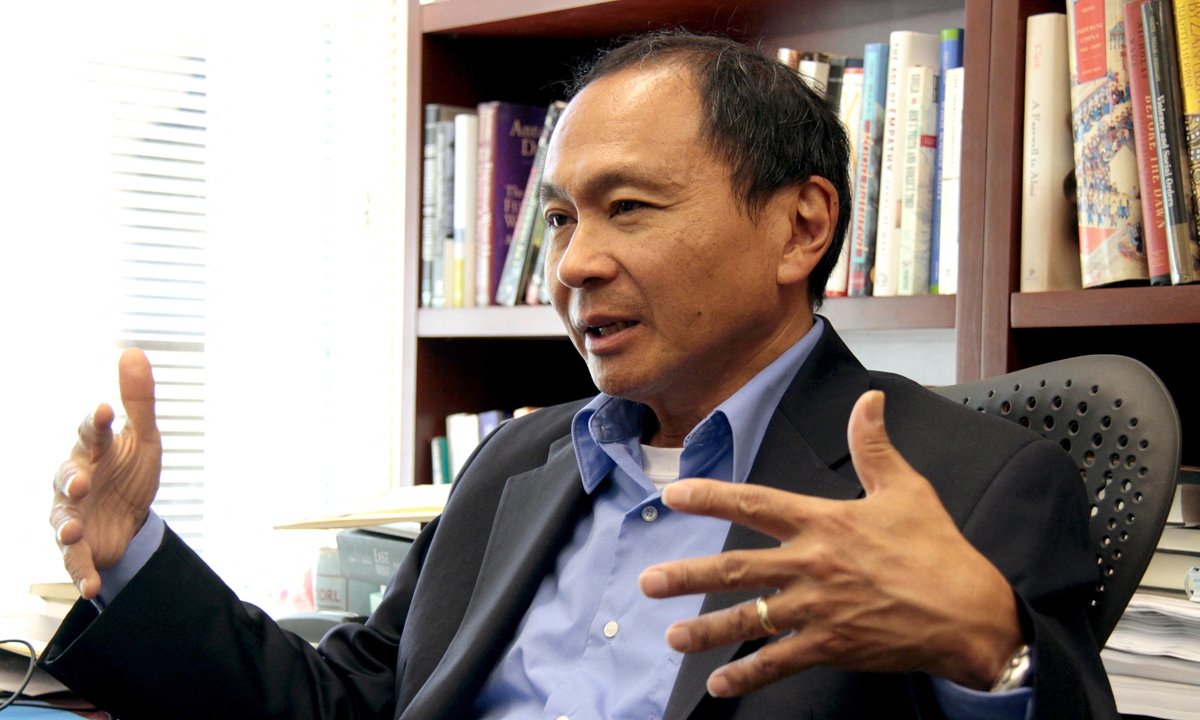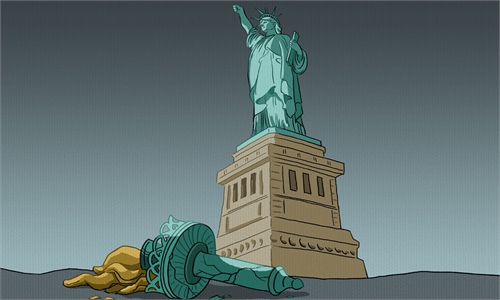Fukuyama's 'Russia's defeat' prediction a reflection of rigid belief and hysteria of the 'end of history' theory

Francis Fukuyama Photo: AFP
Francis Fukuyama, author of "End of History", made a stark prediction recently that "Russia is heading for an outright defeat in Ukraine" which will make possible a "new birth of freedom," and get the West out of the funk about the declining state of global democracy. Fukuyama made a controversial prediction in 1989 arguing that humanity has reached the end of history, which is the end-point of mankind's ideological evolution and universalization of Western liberal democracy as the final form of human government. And now he is predicting Russia's defeat based on the same theory which has been disproven.
Fukuyama stood at the forefront of thoughts and public opinion amid the Ukraine crisis, but what he displayed is not philosophical and political wisdom of reflection and reconciliation, but the rigidity of his belief in liberal democracy and the hysteria of his "end of history" theory.
"Fukuyama is pandering to the US political elites, providing "academic support" for their political demands to shape the global public opinion with American values," said Li Haidong, a professor from the Institute of International Relations of China Foreign Affairs University.
During this current Ukraine crisis, Fukuyama's new prediction almost completely equates victory or defeat with ideology, advocating the old view of color revolutions. His basic logic is: Putin represents a combination of autocracy and populism while Ukraine is representative of leading fighting forces for freedom and democracy. Therefore, the assistance policies toward Ukraine adopted by the US and other Western countries are completely correct while Putin's military adventure will inevitably fail.
Fukuyama has written many lengthy books, but that does not mean that he has profound insight. On the contrary, through his series of statements on the realpolitik, it can be seen that his understanding, analysis and observation is far less insightful than former US secretary of state Henry Kissinger's, much less than Sameul Huntington's, and not even comparable to John Mearsheimer, the father of the theory of offensive realism.
"Fukuyama's recent prediction of 'Russia's defeat' is nothing more than putting himself, a mascot of liberalism, out there to say something that US elites love to hear. The US domestic political culture is dominated by liberalism, and their handling of foreign affairs is an extension of this domestic ideology," said Li. He noted that Fukuyama's statement this time is an application abroad of the old discourse system at home, preaching that US standards and values are applicable globally, and the way the US handles foreign affairs should be an international standard.
However, the US frustrating experience at home in the post-Cold War decades have long proven that this system doesn't work. A foreign country is even less adaptable to the US-style liberalism when it is imposed, having totally different religions, cultures and values. When the US failed miserably in Afghanistan, where were the liberal values?
Fukuyama also warned the Chinese mainland to "not delude itself as to its own capabilities the way the Russians did when contemplating a future move against Taiwan." He said "hopefully Taiwan itself will wake up as to the need to prepare to fight as the Ukrainians have done." His analyses are perfectly in line with the Biden administration's stance and fit well to safeguard the best interests of the US. They have defended the US official position, and offered spiritual support to Ukraine.
In a Washington Post interview on Monday, Fukuyama said a lot of pent-up idealism, the spirit of 1989, and the idea of struggling for a just cause once "went to sleep," and now they are "being reawakened." The US may think its "idealism" is noble, but from the perspective of other countries, it is intending to create more chaos and crises.
Fukuyama dared not think about or speak up about any possibility of the failure of American liberal hegemony. This is not only out of his belief in freedom and democracy, but also his considerations to cater to the public opinion. There is no future for his theory.
There is no so-called end of history. China and Russia are both major political powers with civilizations. Their existence poses challenges to US hegemony and is a critical part of the human civilization system. It's not China and Russia, but the US spirit and Americans that will be isolated if they don't learn to respect and treat other civilizations equally.
The author is a reporter with the Global Times. opinion@globaltimes.com.cn

